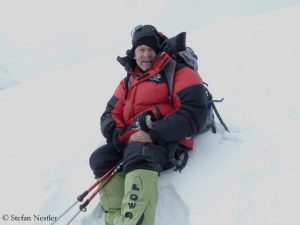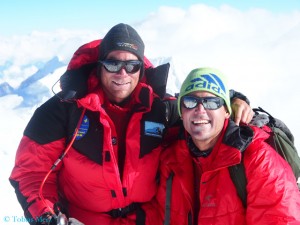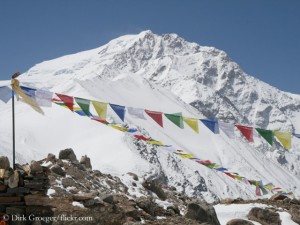Search Results for Tag: high altitude cerebral edema
The “Third Man”
I have experienced it myself. It happened in fall 2011 during my failed summit attempt on the 7,246-meter-high Putha Hiunchuli in western Nepal, somewhere above 7,000 meters. My teammates were out of reach, I was fighting my way up alone, physically and mentally at the limit. “Please!,” I suddenly heard Pemba Nuru, one of our two Climbing Sherpas, say behind me. “Please what?,” I asked and turned around. But nobody was there. Strange. Scientists call the phenomenon the “Third Man”. Descriptions of such hallucinations abound in expedition reports from the highest mountains in the world. Psychiatrists of the Medical University of Innsbruck and emergency physicians of the private research center “Eurac Research” in Bolzano have now examined about 80 such descriptions from alpine literature and discovered, according to their own information, a new disease: the “isolated high-altitude psychosis”.
![]() read more
read more
Oswald Oelz: “Mountaineers are unteachable”
“I will climb until I am dead,” says Oswald Oelz, sitting opposite me recently at the International Mountain Summit in Bressanone. The 73-year-old native of Austria lives as a retiree in an old farmhouse in the Zurich Oberland region in Switzerland. “I have a farm with sheep, parrots, ducks, geese, chickens. I write, read a lot, climb. And I travel around the world.” Oswald called “Bulle” Oelz scaled Mount Everest in 1978, on the same expedition, during which Reinhold Messner and Peter Habeler climbed the highest mountain on earth for the first time without bottled oxygen. Oelz succeeded first ascents in the Alps, in Alaska, Jordan and Oman. Until 2006 he worked as chief physician at the “Triemli hospital” in Zurich. The professor also researched in the field of high altitude medicine.
Oswald Oelz, you are a mountaineer and a doctor, you have got to know both worlds. Time and again, there are fatalities in the high mountains due to high altitude cerebral or pulmonary edema. Has the climbing community learned nothing over the past decades?
![]() read more
read more
HACE, the hidden danger
20 doctors, nearly twice as many test persons. The Swiss research expedition to the seven-thousander Himlung Himal in fall 2013 had the objective to investigate the effects of high altitude on the human body. More than two years later, the first results are there to see. I have talked about it to Dr. Tobias Merz. The 46-year-old is a senior physician at the Department of Intensive Care Medicine at the University Hospital in Bern. Since his youth, Merz has been doing sports in the mountains. So it’s no coincidence that he has committed himself to high altitude medicine too. “In intensive care medicin a disease takes organ systems to the limits of the possible, in high-altitude medicine external conditions are responsible for this,” says Merz. Before going on expedition to Himlang Himal, he had already experienced high altitude as a climber in the Andes and the Himalayas. On the eight-thousander Shishapangma, Merz had reached a height of about 7,600 meters. He then had had to give up his own summit ambitions because he had been needed for a rescue. On Himlung Himal, he stood on the highest point.
Dr. Merz, in 2013 you reached the 7,126 meter-high summit of Himlung Himal. Do you feel somewhat queasy in hindsight if you look at your first research findings?
I already knew that high altitude climbing is a high-risk sport and that it takes you to limits of physiology and rationality. For me, the results were more a confirmation of what I had suspected and less a huge surprise.
But you have worked out something worrying for high altitude mountaineers.
![]() read more
read more
German climber dies on Shishapangma
The sad news from the Himalayas don’t stop. On the 8000er Shishapangma in Tibet a German climber died of a high altitude cerebral edema. The expedition agency Amical alpin informed that the climber from the Bavarian region Chiemgau had belonged to a group of six members who, together with expedition leader Thomas Laemmle and their Climbing Sherpa Pasang, had reached the 8013-meter-high central summit of Shishapangma on 10th May. While descending the climber at first had shown symptoms of a high altitude pulmonary edema.
![]() read more
read more









Feedback